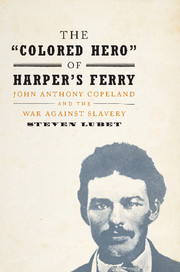Book contents
- Frontmatter
- Dedication
- Contents
- Acknowledgments
- Author's Note
- Prologue
- 1 The Frozen River
- 2 A Good Abolition Convention
- 3 The Colony and the College
- 4 “A Most Well Disposed Boy”
- 5 “I Have Found Paradise”
- 6 “My Object in Coming to Oberlin”
- 7 Not a Fugitive Was Seized
- 8 The New Marshal
- 9 “Recital of the Wrong and Outrage”
- 10 Wack's Tavern
- 11 A Brace of Pistols
- 12 The Oberlin Rescue
- 13 “The Black Mecca”
- 14 The Felons' Feast
- 15 Votaries of the Higher Law
- 16 “The Bravest Negroes”
- 17 The Invisibles
- 18 The War Department
- 19 Hall's Rifle Works
- 20 “His Negro Confession”
- 21 Nothing Like a Fair Trial
- 22 An Abolition Harangue
- 23 Only Slave Stealing
- 24 This Guilty Land
- 25 The Colored American Heroes
- Epilogue
- Notes
- Bibliography
- Index
6 - “My Object in Coming to Oberlin”
Published online by Cambridge University Press: 05 July 2015
- Frontmatter
- Dedication
- Contents
- Acknowledgments
- Author's Note
- Prologue
- 1 The Frozen River
- 2 A Good Abolition Convention
- 3 The Colony and the College
- 4 “A Most Well Disposed Boy”
- 5 “I Have Found Paradise”
- 6 “My Object in Coming to Oberlin”
- 7 Not a Fugitive Was Seized
- 8 The New Marshal
- 9 “Recital of the Wrong and Outrage”
- 10 Wack's Tavern
- 11 A Brace of Pistols
- 12 The Oberlin Rescue
- 13 “The Black Mecca”
- 14 The Felons' Feast
- 15 Votaries of the Higher Law
- 16 “The Bravest Negroes”
- 17 The Invisibles
- 18 The War Department
- 19 Hall's Rifle Works
- 20 “His Negro Confession”
- 21 Nothing Like a Fair Trial
- 22 An Abolition Harangue
- 23 Only Slave Stealing
- 24 This Guilty Land
- 25 The Colored American Heroes
- Epilogue
- Notes
- Bibliography
- Index
Summary
FUGITIVE SLAVES AND FREE BLACKS MADE THEIR WAY to Oberlin throughout the antebellum era, engendering great pride in the colony while drawing the wrath of many pro-slavery Ohioans. Pro-southern Democrats in the state legislature made four attempts to revoke Oberlin's charter between 1837 and 1843 as undisguised retribution for the school's opposition to slavery. As one antagonistic state senator put it, Oberlin had become “the great national manufactory of ultra-abolitionists” who lured slaves from the South for the purpose of “secretly conveying them through the state of Ohio, and transporting them to Canada.” The charge was true, if exaggerated on all sides. According to Professor James Harris Fairchild, the proposed revocations were based on “a thousand unfavorable rumors in relation to amalgamation, fanaticism, harboring fugitive slaves … without any evidence of their truth before the legislature.”
In fact, the number of fugitives was never as great as the Oberliners boasted or their adversaries feared, but it was sufficient to draw the attention of slave hunters, both Southern and domestic. The “manstealers” had a relatively free hand elsewhere in Ohio, seizing uncounted victims annually in reliance on Prigg v. Pennsylvania, a decision of the U.S. Supreme Court that gave slave owners the “positive, unqualified right” to recapture their slaves anywhere in the Union. Although the Supreme Court had been unequivocal that no one could “be permitted to interfere with, or to obstruct, the just rights of the owner to reclaim his slave,” people in Oberlin saw things differently. And although a steady stream of slave catchers did attempt to ply their trade in Oberlin, they were always rebuffed, to the great delight of the collegians and townsfolk.
- Type
- Chapter
- Information
- The 'Colored Hero' of Harper's FerryJohn Anthony Copeland and the War against Slavery, pp. 47 - 54Publisher: Cambridge University PressPrint publication year: 2015



